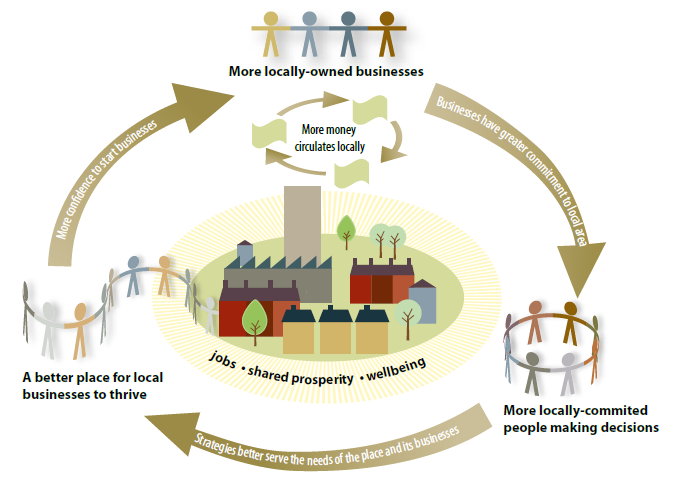Karen Leach of Localise West Midlands blogs about progress so far on establishing local economic models in the region
The biggest levers for real social change are in economic development. Whether it be campaigning for a living wage, getting social value into public procurement, or taking the principle of maximising the local reach of prosperity into how we operate our economy.
The idea that prosperity could be localised led to our work this year to generate practical changes locally, based on the findings of last year’s research into the social outcomes of a more localised approach to economics. There is a need to appeal not just to those of us for whom social issues are our bread and butter, but also to those whose primary role is mainstream economics and who tend to dance to the trickledown tune – that any growth is good growth, and the faster the better, with the question of ‘who benefits?’ being overlooked.
The Localising Prosperity web resource is Localise West Midlands’ attempt to capture this wider appeal. It describes the ‘virtuous circle’ relationship between more locally owned businesses, more local power, better social outcomes and more widespread prosperity. It outlines how this virtuous circle can be fostered through economic interventions, procurement and community activism. It gives some tactics and guidance for these different audiences, and some inspiring case studies and evidence for how effective this model is from the UK and abroad.
We’ve been working with Right Care Right Here, an excellent health sector led partnership across Sandwell and West Birmingham with a strong awareness of the need to tackle the broader social issues that affect health, such as housing and employment; the procurement process is as important as A & E is as a tool for looking after local people’s health.
We’ve also been working with locally-owned businesses to develop a model for SMEs (small and medium enterprises) to win business in the retrofit sector (the transformation of buildings to make them more energy efficient), with the aim of localising prosperity and encouraging social inclusion – learning from case studies of business co-operation in Italy and Spain.
These Black Country and Birmingham collaborations have been very encouraging. The Black Country has a ‘needs must’ track record of work on localising prosperity; Birmingham perhaps less so – its global/second city status historically giving it a rather blinkered fixation on inward investment, conferences and iconic buildings. But more recently, Birmingham has been rediscovering its own potential for generating prosperity. The City Council has seen the need to use new levers to ensure greater fairness within its economy as welfare or grant safety nets are removed. One of its innovations is the Birmingham Business Charter for Social Responsibility, to which its supply chain is required to sign up with its own individually tailored action plan. The Charter requires socially responsible behaviour including commitments to buying and employing locally. From our perspective the real strength of the Charter is its demonstration that if we all share this commitment, we will all prosper.
Leading on from these innovations in the West Midlands area, and mindful of devolution developments across England and of case studies from abroad, wouldn’t it be brilliant to form a ‘Lepa-like’ – a Localising Everyone’s Prosperity stakeholder partnership for the conurbation, with explicit social objectives, and built on local private sector commitment to the area? Matching up local business needs and skills; encouraging local financing models and buying local commitments, at the same time as basing our sense of identity on the enterprise that we own and making work for our collective benefit.

